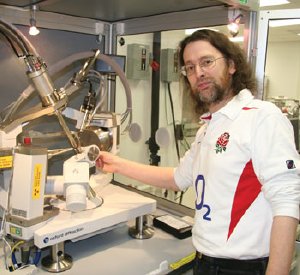Dec 22 2009
Ross Angel, research professor of geosciences and adjunct professor of biological sciences at Virginia Tech, has been selected to receive the 2011 Dana Medal from the Mineralogical Society of America (MSA).

Angel, who also directs the university’s Crystallography Laboratory in the College of Science, will receive the honor for “sustained outstanding contributions through original research in the mineralogical sciences.”
The medal is named for James Dwight Dana, a 19th-century American geologist, mineralogist, and zoologist who made ground-breaking discoveries in mountain-building, volcanic activity, and the origin and structure of continents and oceans. The MSA names the recipient of the medal a year in advance. Angel is the second faculty member from geosciences to be presented with the Dana Medal. In 2002, Michael F. Hochella, University Distinguished Professor of Geosciences, was given the honor.
Angel’s research is in crystal physics and crystal chemistry with the aim of determining the relationship between physical properties of a material and its atomic structure. His particular focus is measuring the changes in crystal structures subject to very high pressures. The results have direct applications in geology and geophysics for understanding the structure of the Earth, and in materials science where his experiments have revealed new phenomena in crystalline materials with industrial and commercial applications.
Angel joined the faculty in 2001. With Nancy Ross professor of mineralogy and associate dean for research in the College of Science, he established the university’s crystallography laboratory in collaboration with industrial partners Oxford Diffraction. The lab performs X-ray diffraction measurements in support of research programs in chemistry, geosciences, physics, and biological sciences.
Among Angel’s many honors are: Fellow in the MSA, recipient of the European Mineralogical Union Medal for Research Excellence, and the Max Hey Award of the Mineralogical Society of Great Britain. He earned his Ph.D. in earth science from the University of Cambridge, England.